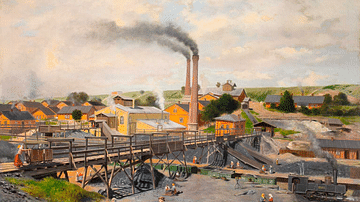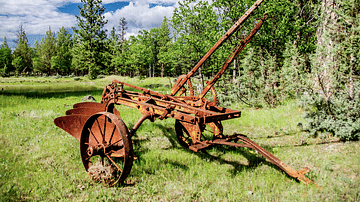Review

| Rating: | |
|---|---|
| Title: | Profit: An Environmental History |
| Author: | Mark Stoll |
| Audience: | University |
| Difficulty: | Easy |
| Publisher: | Polity Press |
| Published: | 2022 |
| Pages: | 280 |
Organized and following a chronological order, Mark Stoll's book uses a historical perspective to link profit-making in capitalism with the harm done to the environment. This book traces the practice of capitalist philosophies and human-caused environmental pollution back to our first agrarian and pastoral societies. Although the book’s depth might not satisfy experienced history scholars, Stoll's writing is an excellent read for history enthusiasts or undergraduate students.
After the Industrial Revolution, factories appeared throughout the world, producing more and more affordable goods while exploiting our environment. Besides air pollution, rivers have been contaminated by waste, and mining has eroded soil. In Profit: An Environmental History, Mark Stoll studies how the consequences of the capitalist pursuit for profit, such as intensive farming and waste discharges from factories, have deteriorated the natural environment throughout history. Stoll argues that the Industrial Revolution was far from the beginning of environmental contamination. Rather, capitalist ideas have been accompanying humans since the beginning of agriculture. Thus, the first agriculture witnessed some of the earliest environmental harms we have left on Earth. Capitalistic thoughts – wanting extra goods or profit – is quite fundamental to our thinking. Using both qualitative historical sources and quantitative scientific studies, this book is a concise and interdisciplinary history of capitalism.
Stoll's thesis centers around the claim that, in history, there have been different types of capitalist epochs: incipient capitalism, mercantile capitalism, plantation capitalism, industrial capitalism, and consumer capitalism. Each of them has negatively affected our environment in different ways. Stoll believes that the transition from the previous form of capitalism to the next was often caused by technological developments that allowed us to discover and exploit more natural resources. Incipient capitalism was formed with the appearance of agriculture and pastoralism around 12,000 years ago. As communities grew larger in population, forests were cut down to make room. Stoll shows that, into the Middle Ages and the early modern period, with developing technology, trade, and colonialism, mercantile and plantation capitalism appeared. The steam engine jumpstarted industrial capitalism, and consumer capitalism tried to digest excessive production.
The book's nine chapters follow a chronological order, and each chapter is centered around one or two specific historical events or people. Chapter One looks at the earliest capitalist ideas during the first agrarian states. Chapter Two uses Christopher Columbus' story as the backdrop to explore imperialism's effect on the environment through building oversea plantations and trading foreign natural products. Chapters Three and Four focus on the Industrial Revolution through James Watt's and Andrew Carnegie's histories. In Chapter Five, we see some attempts to reflect on environmental damages through George P. Marsh's 1864 book Man and Nature. Chapters Six to Nine study how, as we can produce more goods – from automobiles to food – than necessary, companies tried different advertisements and incentives to let the public buy more than they need, thus spurring consumer capitalism today. The book contains 15 images of symbolic moments in the history of capitalism, such as sugarcane plantations in Latin America and the Marshall Field & Company's retail store.
Stoll's book tries to trace the root of 21st-century consumer capitalism back to the origin of human agriculture. This book achieves it partially, due to the book's focus on Europe and United States. Readers would wonder about how profit-based thinking might fit into Asian, African, and other areas' history. In addition, the book's length does not allow it to include many other significant historical events. One would expect Stoll to create more work on this topic to fully develop his connection between capitalism and environmental history. Nevertheless, this book lets us reflect on the harm done to our environment as we purchase goods in a department store or online.
Mark Stoll is Professor of Environmental History at Texas Tech University and has written two books on capitalism history. For experienced scholars, Profit: An Environmental History might read like a collection of historical stories. With limited jargon and a focus on providing narratives, however, this book would be an enjoyable read for non-experts or high school students. Undergraduate history, environmental studies, and economics students looking for introductory reading material can also benefit from this book's broad time range.
About the Reviewer
Cite This Work
APA Style
Zou, Z. (2023, January 31). Profit: An Environmental History. World History Encyclopedia. Retrieved from https://www.worldhistory.org/review/315/profit-an-environmental-history/
Chicago Style
Zou, Zhihui. "Profit: An Environmental History." World History Encyclopedia. Last modified January 31, 2023. https://www.worldhistory.org/review/315/profit-an-environmental-history/.
MLA Style
Zou, Zhihui. "Profit: An Environmental History." World History Encyclopedia. World History Encyclopedia, 31 Jan 2023, https://www.worldhistory.org/review/315/profit-an-environmental-history/. Web. 29 Apr 2025.




